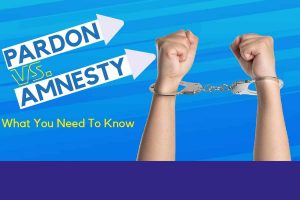Pardon Vs. Amnesty: What You Need To Know
Share
Pardon and amnesty are two popular words. Unfortunately, most people use them interchangeably.
Pardon and amnesty are called clemency powers. These powers are mostly possessed by the head of state, the executive arm of government.
In this case, we are referring to the presidential system of government. These clemency powers also extend to state governors.
In this post, the aim is to discuss pardon and amnesty. After reading, you’ll understand the differences, including when to use both terms. Keep reading!
What Pardon Is
Pardon is the government’s decision to forgive a person of all or some of a crime’s punishment. It exempts a person from the results of his criminal conviction. The power to pardon is the right of the people; they vest this power on whoever they vote in.
State constitutions usually point out where the pardoning power lies. The decision to grant or deny pardon rests on the executive. This may be a state governor or the President. The decision is final, and the judiciary does not review it.
Types Of Pardon
Absolute pardon:
This is also called unconditional pardon or full pardon. Its pardon granted a wrongdoer to relieve the individual of any punishment and restore their civil rights without conditions or restrictions. However, it does not remove the conviction from the person’s criminal record. For instance, Gerald Ford granted pardon to Richard Nixon after he resigned from the presidency. It absolved his punishment for the Watergate scandal.
Partial pardon:
This refers to a pardon that absolves the offender from some punishment of a crime. It does not relieve the offender from the whole sentence. For example, a person might be convicted of murder with a 50 years jail term. He might be granted a partial pardon. With this, he only has to serve a ten years jail term.
Conditional pardon:
This is the exemption of an offender from the legal punishment of his offenses if he satisfies a necessary condition. For example, a man robbed a bank, and he was given a 16 years jail sentence. This kind of person can get a conditional pardon. But the pardon can only become effective after helping the authority to locate the robbery mastermind. Also, he must not break any law, or his pardon will become void, and he will return to prison.
What A Pardon Does And Doesn’t
A pardon doesn’t show that the person is innocent. It doesn’t clear the convictions. It only restores a person’s civil right.
Pardon restores the right of the offender to vote. It also restores the person’s right to run for and hold public office. He will also have the right to serve on a jury and the right to possess firearms. A pardon can also prevent the offender from deportation if he committed a deportable offense.
A pardon doesn’t change the civil results of the crime. For example, if someone who committed murder receives a pardon, they may still go through a lawsuit for wrongful death. Pardons usually do not affect administrative consequences, like license suspensions.
What Amnesty Is?
Amnesty is when the government allows criminal or political offenders (a group or class of people) to go scot-free. The crimes are usually political. Amnesty is also traditionally given with the condition of obedience to the law within a certain period.
Amnesty is usually granted to a group of people that committed crimes against the state. Such offenses may include illegal immigration, treason, or deserting the army. However, it does not give anyone the right to commit future crimes. Also, it does not pardon crimes that are yet to be committed.
An amnesty does not condone nor clear a criminal offense, but it only gives room for political reconciliation.
Weapon amnesties are usually granted so that people can hand in weapons to the police. It goes without any legal questioning as to where they got them or why they had them. After a civil war, the government may decide to grant mass amnesty to absolve everyone in the war. Amnesties are usually applied before any prosecution for the crime.
Types Of Amnesty
Self-amnesty:
This is when institutions or perpetrators grant themselves and their members an amnesty. The reason is to prevent all forms of investigations and prosecutions. It’s often done at the beginning of a new political era.
Blanket amnesty:
This is an amnesty for a large number of people and offenses. But it does not require the beneficiary to meet any conditions before enjoying the amnesty. An example is an amnesty for illegal immigration into the United States.
Conditional amnesty:
This requires an offender to satisfy some conditions before he is given an amnesty. For instance, he may need to provide a confession.
De facto or effective amnesty:
This is granted by a law, decree, and regulation that do not clearly state civil actions or prosecutions but have the same effect.
How To Obtain A Presidential Pardon
Article II of the U.S. Constitution gives the President the power to grant pardon to people who have committed federal offenses.
The President can pardon a person for nearly any offense against the United States. But, the power isn’t unlimited. For instance, the President cannot grant a pardon in cases of impeachment.
The President can grant a pardon through any process and for any reason. But he or she needs to rely on the Office of the Pardon Attorney in the Department of Justice to evaluate pardon requests. The Pardon Attorney only makes a recommendation. The President decides whether one can get the pardon or not.
To request a pardon, you have to submit a formal application to the Office of the Pardon Attorney. The office of pardon evaluates the basis of each request and considers different factors. It may include the person’s conduct after the conviction and how severe the offense is.
He or she may also consider the extent to which the individual accepted responsibility for his crime. The Deputy Attorney General and the prosecutors that handled the case may also consider the recommendation to grant a pardon.
However, the President may choose to skip the Pardon Attorney and issue a pardon without any recommendation from the Department of Justice.
The President can pardon as many people as he chooses to. For instance, President Obama pardoned 212 people during his time in office. President Franklin D. Roosevelt, on the other hand, pardoned 2,819 people during his tenure.
Benefits Of A Pardon
Restores your rights:
If you’re convicted of a crime, you will lose your right to own a gun, vote, get a passport, serve on a jury, and hold public office. When you are granted a pardon, these rights are restored. It will enable you to participate as a member of your community.
Provides official confirmation that you are law-abiding:
A pardon will not clear your criminal record. However, it acknowledges that you have worked diligently to become a productive, law-abiding member of your society. Also, you can be admitted to a professional school or take the Civil Service Examination.
Removes the stigma associated with criminal behavior:
The stigma associated with a criminal conviction can be difficult to erase. The official forgiveness from the President or state that accompanies a pardon is usually essential in erasing the stigma that comes with criminal convictions.
Ability to get employed easily:
One of the most important benefits of a pardon is the ease of securing a job. Employers don’t easily hire a convicted felon, but they will consider you when you’re granted a pardon.
Disadvantages Of A Pardon
- The victims of the crime usually feel cheated. Sometimes, the victims tend to voice out their unfair treatment.
- The pardon does not clear the criminal record of the convicted person. People may see it during a background check.
Benefits Of An Amnesty
It avoids expensive prosecutions:
It is useful when a large number of violators are involved. The cost of prosecuting a large number of people is high. Hence, granting them amnesty will prevent this cost and help them give up their violations.
Prompts an offender to come forth willingly:
When violators are granted amnesty, they willingly come forward. They easily surrender arms or confess crimes, as the case may be.
Promotes reconciliation:
Amnesty reconciles offenders and society. It creates an avenue to live in a peaceful community.
Disadvantages Of An Amnesty
- An amnesty usually sends out the wrong message. It seems unfair to law-abiding people. They may see the amnesty as rewarding people who have broken the law.
- It usually increases crime. Some criminals may exploit it to their advantage.
Differences Between Amnesty And Pardon
Amnesty can be granted to people that haven’t faced any trial or been convicted. But a pardon is given to people who have been convicted.
A pardon is granted to only individuals, while amnesty is granted to a group of people. Amnesty is mainly given in political situations to address some issues that are of national importance.
In pardons, the criminal records of the person are not cleared. It’s because he has already been convicted in court.

















